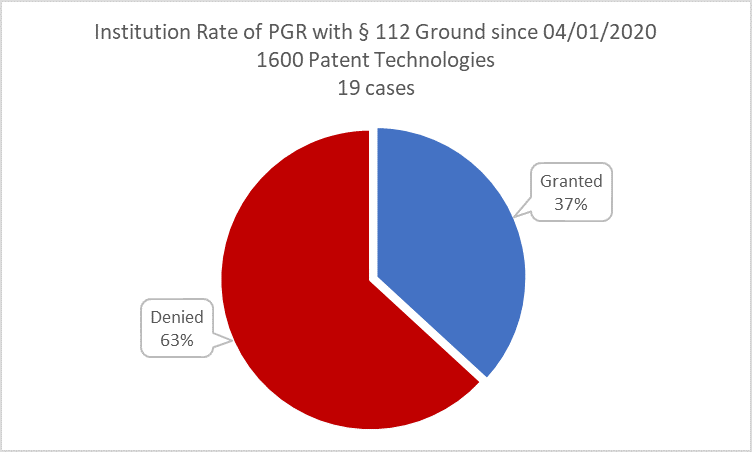In recent years, the Court of Appeals for the Federal Circuit has invalidated or affirmed the invalidity of various biopharma patents under 35 U.S.C. § 112, which requires that a patent specification contain a written description of the invention and enable any person skilled in the art to make or use the invention. The court system, however, is not the only venue for such invalidity challenges. Post Grant Review (PGR) provides an alternative opportunity to challenge newly issued first-inventor-to-file patents on any and all grounds of invalidity, including § 112 grounds, before the Patent Trial and Appeal Board (PTAB). But, these challenges come with a significant estoppel risk. That is, an unsuccessful PGR petitioner will be estopped from raising arguments that “reasonably could have been raised” in the PGR process during subsequent district court proceedings. When weighing this heightened estoppel risk, one factor to consider is how § 112 challenges have historically fared at the PTAB.
In a prior survey of PGRs for bio, pharma, and chemical patents prior to April 30, 2020, a total of 28 cases, revealed an institution rate of roughly 64%. It further concluded that there was a 78% success rate of finding challenged claims unpatentable in the instituted PGRs that had reached a final written decision.
This article updates that earlier analysis.
We first determined the outcomes of the previously pending PGRs with § 112 challenges, i.e., PGRs instituted prior to April 30, 2020, with no final written decision at the time of the prior survey. We identified six final written decisions for such PGRs in the biotechnology and organic chemistry technologies (the 1600 patent technologies). In these final written decisions, two found the claims to be unpatentable on at least § 112 grounds (33.33%), one did not find the claims to be unpatentable on any ground (16.67%), and three found the claims to be unpatentable on grounds other than § 112 (50%).
We next surveyed the PGRs instituted since April 1, 2020, with at least one asserted § 112 ground of unpatentability, in the 1600 patent technologies, a total of 19 cases (as of 11/01/2021).

Our survey revealed a roughly 37% institution rate. Of the seven instituted PGRs, only three cases have received a final written decision to date. All three final written decisions invalidated claims of the challenged patent on at least one § 112 ground, giving a 100% success rate thus far for the instituted PGRs. Of the remaining four cases, three are still awaiting a final written decision and, in one case, the patent owner disclaimed the patent before a final written decision was issued.
A comparison between our results and the prior survey suggests that there has been a significant decrease in institution rates, but it should be noted that the numbers of PGRs in these analyses are small. Even if institution rates have markedly declined, it should not discourage patent challengers from bringing PGRs based on § 112 grounds because no estoppel attaches in cases that are not instituted. And, when a PGR is instituted, the success rate for finding claims unpatentable has remained high.
________________________
To make sure you do not miss out on regular updates from the Kluwer Patent Blog, please subscribe here.


